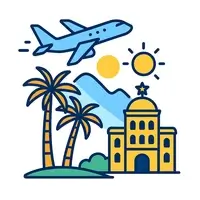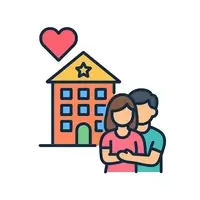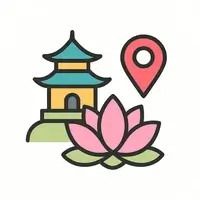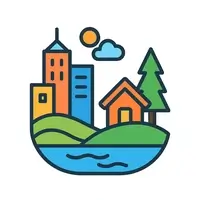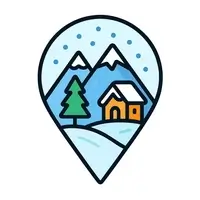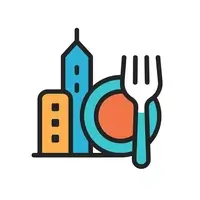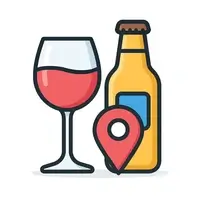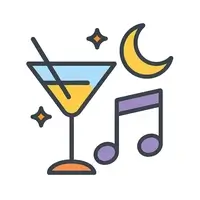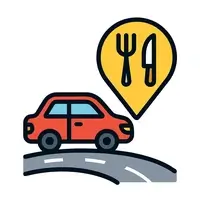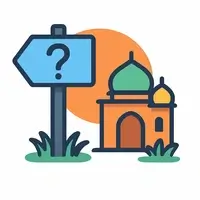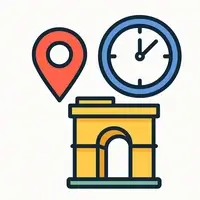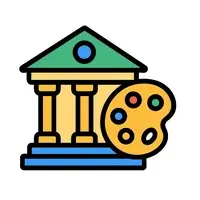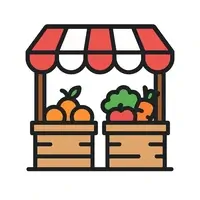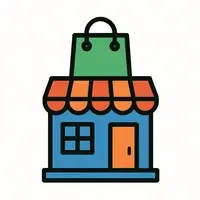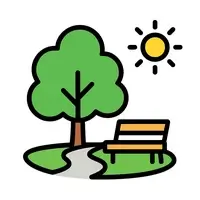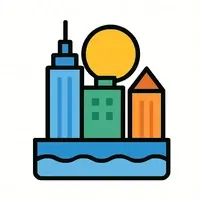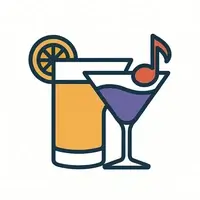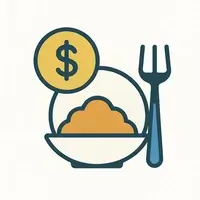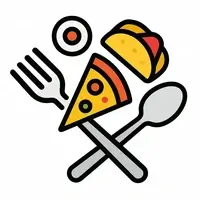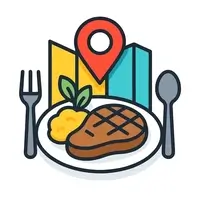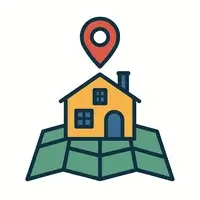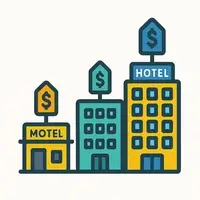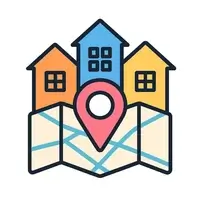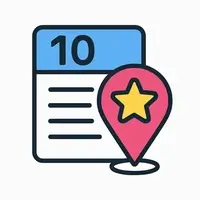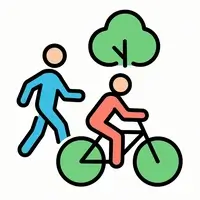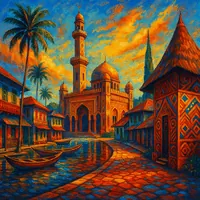
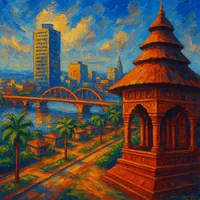
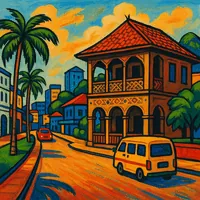
Douala, Cameroon
Population: 5,768,400
Douala, the economic heartbeat of Cameroon, is uniquely characterized by its vibrant port, one of the busiest in Central Africa, acting as a vital trade artery for landlocked countries. The city's duality is palpable with the Wouri River bisecting it, fostering a thriving maritime culture. Douala's eclectic architecture, where colonial edifices coexist with futuristic skyscrapers, mirrors its history and optimism for innovation. Notably, its "Sawa" cultural vibrancy, marked by the annual Ngondo Festival, celebrates the deep-rooted traditions of the coastal peoples.
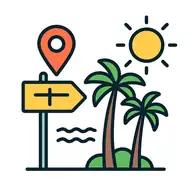












Notable points about Douala
- Economic Hub: Douala is the largest city and the economic capital of Cameroon. Known for its bustling port, the Port of Douala, it serves as a vital transit point for trade across Central Africa, handling a significant portion of the country's import-export activities.
- Cultural Melting Pot: The city is a cultural melting pot, with a diverse population comprising various ethnic groups, including Duala, Bassa, and Bamileke, among others. This diversity is reflected in the city's cuisine, music, and festivals, offering a vibrant and eclectic cultural experience.
- Lively Nightlife: For singles and night owls, Douala offers a lively nightlife scene with a variety of bars, clubs, and live music venues. Popular spots like Bali and Akwa are known for their energetic ambiance and are great places to socialize and enjoy Cameroonian music, including Makossa and Bikutsi genres.
- Rich History: Douala is home to historical landmarks such as La Pagode, the former palace of the German colonial governor, and the Doual'art contemporary art center, which showcases the city's colonial past and its evolution into a modern African city.
- Urban Greenery: Unlike several other cities in Cameroon, Douala boasts notable urban greenery with places like the Douala-Bassa Forest and the Limbe Botanic Garden on its periphery, providing nature lovers and families with kids enjoyable escapes within the bustling urban environment.
- Culinary Delights: For food enthusiasts, Douala offers a rich culinary scene with local dishes like Ndolé (bitterleaf stew), Soya (grilled skewered meat), and fresh seafood. The city's street food markets are a must-visit for a taste of authentic Cameroonian flavors.
- Transportation Hub: Doula's role as a major transportation hub is emphasized by its international airport, Douala International Airport, which is one of the busiest in Central Africa. This makes it a strategic location for business travelers and tourists wanting to explore the region.
- Art and Crafts: Couples seeking unique souvenirs and artistic experiences can explore Marché des Fleurs and artisan shops that offer a wide variety of traditional crafts, including wooden sculptures, vibrant textiles, and intricate beadwork.
- Climate and Lifestyle: With a tropical monsoon climate, Douala experiences heavy rainfall and high humidity, contributing to its lush landscapes. The city's warm and friendly atmosphere, combined with its dynamic pace of life, offers retirees a unique setting that blends vibrancy and relaxation.
- Education and Innovation: Douala stands out within Cameroon for its educational institutions such as the University of Douala, which fuels the city's reputation as a center for innovation and academic excellence, attracting students and researchers from across the country and beyond.
Summarized Traveller Reviews
Douala's Neighborhoods
Bonanjo
🎯 Key Attractions
- Palais des Congrès: Douala's stately conference palace, where diplomatic and business events unfold year-round.
- La Pagode: A beautifully preserved colonial mansion once home to German governors.
- Echo Passage: A narrow alley where, every August, old jazz recordings spill from balconies at dusk.
✨ Unique Aspects
Elegant remnants of German and French architecture linger along sun-bleached facades.
Akwa
🎯 Key Attractions
- Marché Central: An animated market where you can buy anything from mangoes to motorcycle mirrors—especially busy on Friday mornings.
- Salle des Fêtes d’Akwa: A timeworn concert hall that still echoes with the legends of Makossa music from the 70s.
- The Neon House: A once-abandoned building turned into a glowing maze of digital art every December.
✨ Unique Aspects
Feels like stepping into a memory of 1990s street life—radio static, perfume peddlers, and taxi horns.
Bonapriso
🎯 Key Attractions
- Maison H: A sleek concept store with locally designed clothes and unforgettable ginger lattes.
- La Mandarine: Pastries that taste like Saturday mornings in Paris—and a rooftop view you’ll remember from your last visit in April.
- Rue des Senteurs: A flower-lined residential street that blooms in full lilac around early June.
✨ Unique Aspects
You’ll find gated homes next to art galleries—it’s the kind of place where dogs are walked at sunset and names are remembered at the bakery.
Makepe
🎯 Key Attractions
- Campus Café: A hangout spot for university students—good Wi-Fi, live poetry nights every other Thursday.
- Parc de Makepe: A casual community park that fills up with families and football games around 4PM.
- The Tarmac Studio: A rooftop creative lab where local rappers and painters mix sounds and stories till midnight.
✨ Unique Aspects
Street art tags walls here like whispered ideas left behind after finals week.
Bonamoussadi
🎯 Key Attractions
- Snack Bar Triangle: Known for its grilled fish and late-night DJs—especially packed on Saturdays around 11PM.
- Carrefour Market Bonamoussadi: A lively shopping hub that acts as the area’s informal heartbeat.
- The Labyrinth Kitchen: A back-alley food court serving 12 kinds of suya, open till the last beer is poured.
✨ Unique Aspects
It’s where everyone ends up after the party or before heading to one—familiar faces guaranteed.
Logbessou
🎯 Key Attractions
- Université de Douala - Campus Logbessou: A growing academic hub drawing young minds and quiet cafés.
- Mont de Logbessou: A small hill trail that gives a hazy view of Douala rooftops at sunrise in December.
- The Circle Market: A circular weekend bazaar where farmers sell produce alongside wandering storytellers.
✨ Unique Aspects
Feels like the city hasn’t quite found it yet—perfect for those who prefer places that feel undiscovered.
Deido
🎯 Key Attractions
- Ancienne Cathédrale de Deido: A solemn structure that’s seen baptisms, funerals, and generations of echoes.
- Centre Culturel Sawa: Celebrates the traditions, languages, and dances of the coastal people.
- Le Mboa Kraal: A community-run open-air amphitheater where elders tell stories at dusk during Harmattan season.
✨ Unique Aspects
Every corner here tells a story your grandfather might nod at knowingly.
Bali
🎯 Key Attractions
- Marché Bali: A locals-only type of market, where you learn names and get fruit recommendations.
- St. Joseph’s Church: Simple yet graceful—bells chime every Sunday morning at 9AM sharp.
- The Balcony Path: A rooftop walking route connecting three apartment buildings, popular with teenagers at twilight.
✨ Unique Aspects
There’s a stillness here that feels like it belonged to a slower decade.
Ndogbong
🎯 Key Attractions
- École Publique de Ndogbong: A longstanding local school—its walls painted with math tables and proverbs.
- Parc de la Jeunesse: Popular on Sundays with picnicking families and impromptu soccer games.
- Chez Tonton André: A backyard-style eatery open since 1984, where the sauce jaune hasn’t changed.
✨ Unique Aspects
It’s the kind of place where generations live next to each other—and everyone remembers the mango tree that used to stand at the old bus stop.
Bépanda
🎯 Key Attractions
- Stade de Bépanda: Where football fans gather and remember matches long after the whistle blows.
- Bépanda Junction: A chaotic yet familiar crossroad where you can buy phone credit, roasted corn, and taxi advice.
- The Vinyl Shop: A hole-in-the-wall music shop that still sells cassette tapes and nostalgic mixtapes every first Saturday of the month.
✨ Unique Aspects
You might pass through quickly—but if you stop, you’ll find layers hiding under routine.










